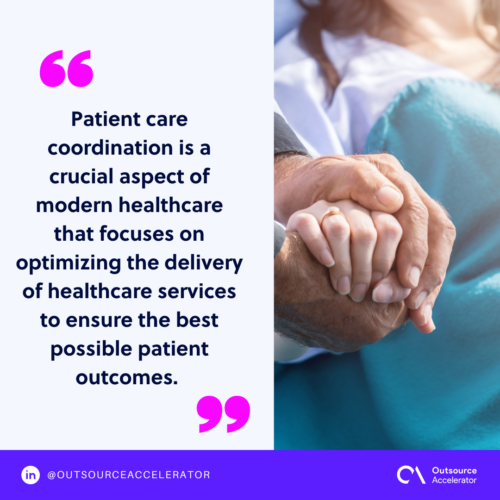How patient care coordination enhances healthcare services

Patient care coordination is a crucial element in delivering high-quality and efficient healthcare services.
Effective patient care coordination fosters a comprehensive approach to healthcare delivery. It focuses on the patient as a whole rather than isolated incidents or specific medical conditions.
Care coordination can transform healthcare services by promoting continuity, collaboration, and the exchange of crucial information. Providing efficient patient care results in improved outcomes, reduced healthcare costs, and enhanced patient satisfaction.
While the specific methods and models may vary across healthcare settings, the fundamental principles remain consistent.
Read below to learn more about patient care coordination and how it improves the overall effectiveness of healthcare services.
What is patient care coordination?
Patient care coordination is a crucial aspect of modern healthcare that focuses on optimizing the delivery of healthcare services to ensure the best possible patient outcomes.
It involves seamless organization, communication, and collaboration among healthcare providers, patients, and caregivers throughout the entire care continuum.
In a complex healthcare landscape with multiple specialists, care settings, and treatment options, patient care coordination is a guiding framework. It helps facilitate effective and efficient healthcare delivery.
At its core, patient care coordination involves several key components. It encompasses interprofessional collaboration, where healthcare providers from different disciplines work together to provide comprehensive and coordinated care.
Importance of patient care coordination in healthcare
Patient care coordination addresses the complexities and challenges inherent in modern healthcare systems. Patients are able to receive constant, well-coordinated care across various providers and care settings.
Patient care coordination enhances continuity of care by promoting effective communication, collaboration, and information sharing among healthcare professionals. It also reduces medical errors and improves healthcare outcomes.
Moreover, patients are empowered to participate in their care actively, fostering patient engagement and satisfaction.

Benefits of patient care coordination
Patient care coordination offers many benefits that significantly impact both patients and the healthcare system. It aims to enhance healthcare delivery’s overall quality, safety, and efficiency.
Below are some ways effective patient care coordination improves healthcare services:
Enhanced continuity of care
Patient care coordination ensures seamless and coordinated healthcare delivery across multiple providers and care settings.
It promotes the exchange of information, medical records, and treatment plans among healthcare professionals. Fragmented care is also minimized, reducing the risk of conflicting advice or duplicate tests.
By improving continuity of care, patient care coordination leads to safer, more efficient, and better-coordinated healthcare experiences.
Improved healthcare outcomes
Effective patient care coordination is associated with improved healthcare outcomes. It reduces delays in diagnosis and treatment by optimizing the scheduling and sequencing of medical appointments, tests, and treatments.
Care coordination also helps prevent medical errors, such as medication interactions or omissions. Pacifying these mistakes lead to better patient outcomes, reduced hospital readmissions, and improved overall health status.
Increased patient satisfaction
Patient care coordination focuses on engaging patients in their care and empowering them to participate in decision-making processes actively.
Through this process, patients feel more informed, supported, and involved in their healthcare journey. As a result, patient experiences and satisfaction are improved.
Cost savings and efficiency
Care coordination enables medical establishments to streamline care processes and reduce unnecessary utilization of healthcare assets.
By avoiding redundant tests, preventing duplicative treatments, and reducing hospital readmissions, care coordination contributes to cost savings and improved resource utilization.
This efficiency allows healthcare systems to allocate resources more effectively, ultimately benefiting patients and the healthcare system as a whole.
Better patient safety
Transitions between different healthcare settings can be complex and challenging for patients. Patient care coordination focuses on managing these transitions and ensuring continuity of care.
By coordinating discharge plans, arranging follow-up appointments, and providing necessary education and resources, care coordination minimizes disruptions in care during transitions. This improves patient safety, reduces complications, and facilitates a smooth and seamless transfer of care.
Key elements of effective patient care coordination
When providing exceptional patient care coordination, certain key components are essential for success. These factors serve as the building blocks that enable healthcare providers, patients, and caregivers to work together seamlessly.
The following sections will explore these key elements in depth, highlighting their importance and contribution to effective patient care coordination.
Interprofessional collaboration
Interprofessional collaboration involves healthcare providers from different disciplines working together to deliver coordinated care. It requires effective teamwork, mutual respect, and shared decision-making.
Care coordinators play a crucial role in facilitating interprofessional collaboration by establishing clear lines of communication. They help promote efficient information exchange and foster a collaborative culture among healthcare teams.
When healthcare providers work harmoniously, it leads to better coordination, improved patient outcomes, and enhanced patient experiences.
This synergy is precisely what a third party healthcare provider should aim to achieve. For instance, Connext Global‘s healthcare services achieve this by promoting a cohesive and patient-centered approach throughout the entire healthcare delivery spectrum.

Communication and information sharing
Communication is a fundamental element of patient care coordination. It involves a clear and timely exchange of information among healthcare providers, patients, and caregivers.
Effective communication ensures that everyone involved in a patient’s care has access to relevant and up-to-date information. This includes medical records, test results, treatment plans, and care instructions.
Care transition management
Care transitions occur when patients move between different healthcare settings, such as hospital to home or primary care to specialty care.
Effective care transition management is crucial to ensure continuity of care and prevent disruptions in the treatment process.
Care coordinators are important in facilitating smooth care transitions by coordinating discharge plans and arranging follow-up appointments. They ensure medication reconciliation and provide patients with the necessary education and resources for self-care.
Patient engagement and empowerment
Patient engagement refers to actively involving patients in their care and decision-making processes. Care coordinators promote patient engagement by educating patients about their conditions, treatment options, and self-care strategies.
They encourage patients to ask questions, express their preferences, and actively participate in developing their care plans.
Patient empowerment is fostered through shared decision-making, providing resources and support for self-management, and helping patients set realistic health goals.







 Independent
Independent




